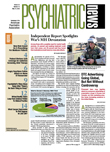The first phase of a new requirement calling for physicians to use tamper-resistant, paper prescription forms in the Medicaid program appears to have gone smoothly.
Karen Sanders, associate director for publicly funded services at APA, said no psychiatrists have called the Association's Managed Care Helpline about treatment problems created by the new requirement since it went into effect on April 1.
“With this, no news is good news,” Sanders said.
A spokesperson for the AMA also told Psychiatric News that her organization had not received any reports of problems from physicians in the first weeks the new requirement being in effect.
The requirement aims to limit fraud in hand-written or computer-generated paper prescription forms by having physicians use prescription forms with at least one antifraud feature for fee-for-service Medicaid patients. That standard will tighten on October 1, when prescription forms will be required to have three safety features.
The specified characteristics are one or more industry-recognized features designed to prevent unauthorized “copying” of a completed prescription or blank form, unauthorized “erasure” or“ modification” of information written on the prescription form by the prescriber, and use of counterfeit prescription forms.
The new requirement does not apply to prescriptions issued electronically or by fax or telephone.
The latest high-tech prescription forms are designed to protect against fraud by making it extremely difficult for any part of the form to be reproduced or altered and, if tampering does occur, to make such deception easy to spot by licensed pharmacists and other legitimate prescription receivers.
Advocates of the new requirement anticipate that the expected drop in fraudulent prescriptions will provide substantial savings. The Congressional Budget Office estimated that the requirement should save taxpayers $355 million over the next decade, mainly by preventing the filling of fraudulent prescriptions.
The tamper-proof requirement was included in a massive budget bill (Pl 110-28) enacted in May 2007, and officials at the Centers for Medicare and Medicaid Services (CMS) set the implementation date for last October. APA and other physician organizations, however, sharply criticized CMS for the hasty implementation (Psychiatric News, August 17, 2007). Physician groups warned that many doctors would be unable to get access to so-called tamper-resistant prescription pads before the deadline; failure to do so could have limited Medicaid beneficiaries' access to medications. They lobbied Congress to intervene and supported legislation (S 2085) that delayed the implementation date for six months only two days before the requirement was to go into effect (Psychiatric News, October 19, 2007).
In 2006, physicians wrote about 330 million prescriptions for Medicaid beneficiaries, which was 11 percent of the nearly 3.1 billion total prescriptions written each year, according to the author of the legislation, Sen. Sherrod Brown (D-Ohio).
The tamper-resistant requirement was not entirely new—10 states had already required it for some prescriptions.
Physicians should contact their state Medicaid program for additional information since each state is allowed to add further restrictions beyond the federal baseline standards. Every state Medicaid agency has issued its own guidance on the prescription-form requirement.
During the six-month delay, CMS took steps to better inform physicians about the tamper-proof requirement. The agency also fielded numerous inquiries from physicians and pharmacists, held informational conference calls, and issued additional written information.
“We remain committed to working with our partners in resolving any issues that may arise,” CMS officials said in a written statement in April after the requirement went into effect.
Additional information on the new requirement is posted at<www.cms.hhs.gov/DeficitReductionAct/30_GovtInfo.asp>.▪
